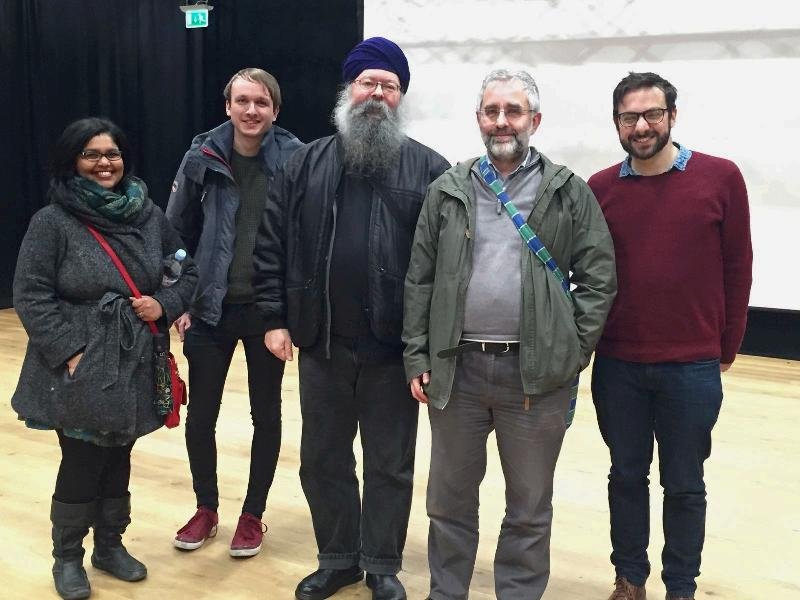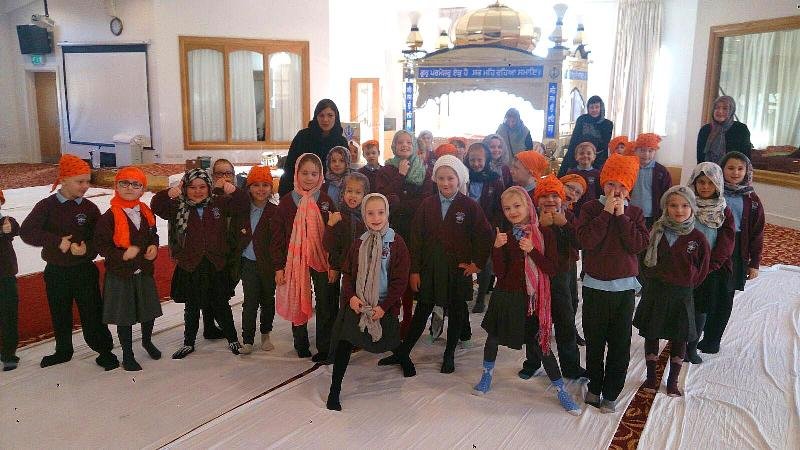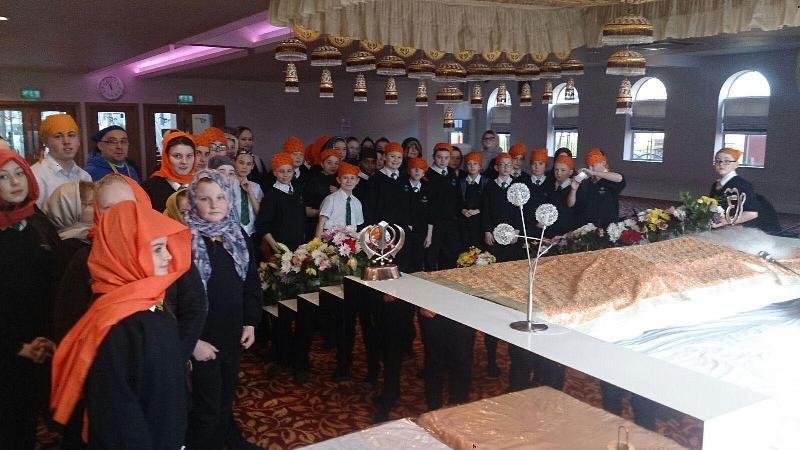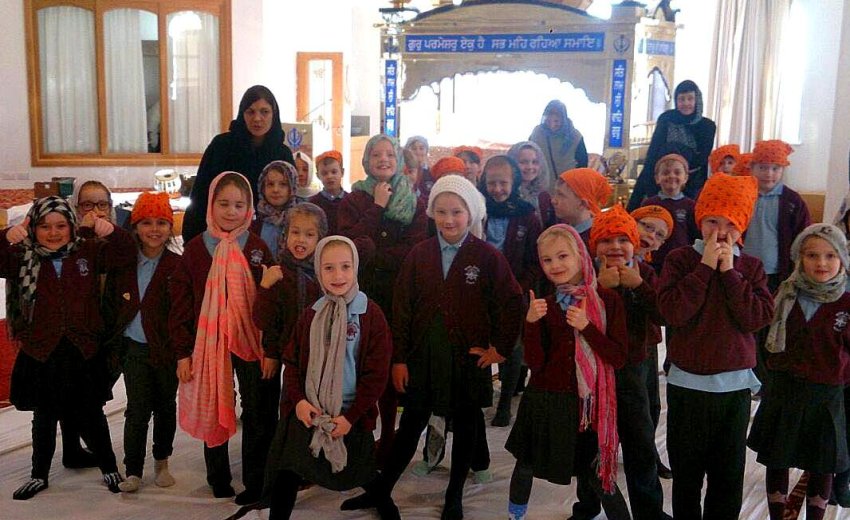
Over the last few years a transformation
has been happening in Newcastle Upon Tyne in the British North East. The Sikh
community, once perceived as insular and standoffish, has been reaching out to
serve and inspire fellow Britons in new ways.
The background to
The Waheguru Project - the forerunner, and in many ways pilot, for The
North East Sikh Services - is I am sure familiar to many people and
peoples. It is not unique to Sikhi. The pattern occurs across all migrant
communities.
The first group of hardy, adventurous souls, the
pioneers who risked much, often everything, for the hope of a better life for
themselves and the families they left 'back home' were successful. They had
fought the bigotry and racism of the host country, learned its ways, worked in
poorly paid jobs for long, long hours and they succeeded. I applaud them, for I
truly don't believe I have that level of determination within me. They brought
with them their culture, food, dress, language, music and, more importantly, their
deep faith.
As is so important to Sikhi, Sangat gathered and
kept on gathering. Families joined loved ones and Sangat increased. Families
here increased in size and the Sangat did so as well. The buildings used for
Gurudwaras moved from front rooms to full houses to members of the community
banding together to risk purchasing and running others unused buildings - often
old churches. And this was all done by people with little previous experience,
voluntarily, whilst continuing to work many hours. And then came the building
of purposefully designed Gurudwaras, because the first ones simply became too
small for the increasing numbers in the Sangat.
During this time Sikhi had become, if not
thoroughly known in detail, then certainly more generally spoken of and
respected in the country. Sikhs were being noticed. Laws were changed for us,
most notably around Kirpan and Dastar and Motorcycle Safety Helmets but in
other smaller ways as well. The Sikh voice was being heard on the national
stage and was beginning to be listened to. And this was good for the children
who wished to retain their roots, their sense of 'first culture' whilst now
being bi-cultural. Sikhs were being seen as no longer 'just' Soldiers or Shop
Keepers or Factory Workers but as educated Professionals and serious business
people. And still the Gurudwara was run on the good faith and Sewa of those who
were dedicated to it.
And then others became curious about the Faith
of the Sikhs. What is it all about? What do they ACTUALLY believe? How do they
pray? When did Sikhism start? These Sikh children in our school, how do we go
about honouring their culture to assist them in becoming whole, rounded
students? This patient here in Hospital, what is their belief regarding blood
transfusion? Is it okay to remove the Turban? What sort of food is it good to
be serving them?
Some people carried on wondering, and often
still are. Others came asking. And the response was met, answers were given.
Individuals who had the time and confidence to begin to answer these questions
did so, often informally at first and later in a more structured way. But still
individuals, generally by themselves, with little coordination or communication
with the others who were also doing this.
And then, in Newcastle-Upon-Tyne at least, things got a bit more organised.
A decision was
made to try to give out a single telephone number, one email address and one
website address to anyone who wanted to visit the Gurudwara or have a Sikh come
visit them. One reliable point of contact.
A sturdy 'bridge' between differing organisations and differing organisational
cultures. A way to relieve the anxieties of those people who work so hard to
get groups to the Gurudwara that there will be someone selected to be there -
on time - to speak in a way in which visitors can begin to understand. Someone
who can speak to groups at multi-faith meetings and events. All these had been
done before, and continued to be done, and well, but not in a coherent and
consistent way - from the point of view of British culture anyway.
And it all happened and worked quite well. The
Waheguru Project organisation ran on a hybrid basis, part time, being
definitely available every Monday and Tuesday and at other times as and when
someone could be arranged. The demand grew. People really really wanted to know
more about Sikhs and Sikhi. Often these were schools, but more and more
Colleges, Universities, Hospitals, Hospices and Community Organisations. Interfaith
organisations and Interfaith Committees came to expect a Sikh to be with them.
And the more people spoke about Sikhs, the more others wanted to know. And
demand for spokespeople outstripped supply.

 With Maharaj's Kirpa — always with this — the
Service has funded a full time worker dedicated to just this task. The Sewadars
are still the most important part, the full time worker is really just the glue
holding it together; making sure the organisation goes well, acting as the
interface and ensuring both sides meet well. But now, instead of saying to
someone wanting a visit or visitor, "Well, we can definitely do Mondays
and Tuesdays, or I can try to arrange for someone for other times" the
response is "Yes. Now, when would you like this to happen?” And so the
general impression of Sikhs and Sikhi, and by turn Guruji, is positive, open,
available, giving and of service to others.
With Maharaj's Kirpa — always with this — the
Service has funded a full time worker dedicated to just this task. The Sewadars
are still the most important part, the full time worker is really just the glue
holding it together; making sure the organisation goes well, acting as the
interface and ensuring both sides meet well. But now, instead of saying to
someone wanting a visit or visitor, "Well, we can definitely do Mondays
and Tuesdays, or I can try to arrange for someone for other times" the
response is "Yes. Now, when would you like this to happen?” And so the
general impression of Sikhs and Sikhi, and by turn Guruji, is positive, open,
available, giving and of service to others.
There is, I think, the generally unspoken issue
of who will do the speaking? Who is 'good enough?' And I would like to suggest
that this question has been asked too early. I understand the speaker/host has
to have a good, considered position on Sikhi and the well rounded ability to
put this across to various groups but at the moment there is often no Sikhi
voice at all on important local governmental committees, school governing
boards or interfaith event panels. And when organisations do ask for someone,
as they so often do, no one can step up.
So can we begin by at least making a Sikh voice available, and more importantly a Sikh presence there, and then we can discuss whether it is of sufficiently good quality? My personal issue is that I am conscious of the fact that when people are being addressed about Sikhi it is more often than not by a man and an Amritdhari. Both of these things do not display accurately or in a balanced way the Sikh diaspora here in the UK - most Sikhs are not Amritdhari and never will be, many are not even turbaned and bearded and at least half are women.
The North East Sikh Services is clearly focused and remains focused. There are and will be many spin offs from its work — all worthy, all valuable and often necessary. It is my belief that there will be people who will feel called to do and motivated to do this work. But time and again there will be new people who wish to know about Sikhi and there will be a need to meet them on their own cultural terms in language they can easily understand — at least to begin with.

In a few short weeks North East Sikh Services has continued to not only host school visits from previously visiting schools as well as add new visitors, but once its presence became known it has:
- Been invited to serve as a faith panellist on a
University Faith Discussion event (after which two degree students came asking
to have Sikhi explained to them then and there — they were to have studied
Sikhi but the lecturer had left before the start of term and was not replaced!)
- Asked to attend the Curriculum Advisory
Committee of a Local Government statutory committee.
- Met with a local Community Worker who
specialises in black and ethnic minorities who was struggling to connect with
the Sangat.
- Traveled 70 plus miles each way to visit a school and liaise with the chaplain of a local hospice.
And all this within just a few short weeks! So many people are thirsty and desperate to hear about Sikhi from anyone who will talk with them.

Sikhi is beautiful and it touches people deeply. It is universal, profound, human and divine and people long to hear about it and then hear more, and more. The simple everyday acts of Sikhi, feeding people, laughing with them, serving side by side, gives people an experience of the happiness and chardikala spirit that we embody. Our joy is contagious. Our presence penetrates the heart and leaves a lasting impression of love, courage and fearlessness.

Please, I beg of you dear Sangat, nurture Sikhi in yourself and in your community. Let it grow and flourish. Tend it well. On the doors of your Gurudwara please put signs saying when it’s open, when it’s open put signs welcoming everyone in, if it’s warm leave the doors open and invite people in. But better yet is to go from the Gurudwara and ‘live in the city,’ politely and quietly inform people in many different ways that if they want to know more, someone will tell them about Sikhi.
And when they ask, make sure you have already found at least one someone who will tell them what they long to know with love in his or her heart; someone who will be there when they say they will; someone who is consistent; someone who smiles and serves joyously.
Each and every Gurudwara can do this, and by doing this nothing but positives can come of it.
If you would like to get started, The North East Sikh Service will love to work with you. We will be happy to help if you simply reach out to us.
Phone: +44 0 7834 698 104
Email: [email protected]
